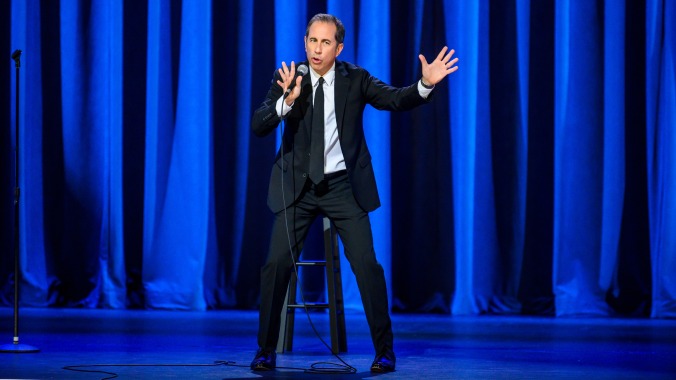Seinfeld has made a career of getting worked up about the small stuff. He’s somehow managed to consistently be both a wildly successful star and a comedian’s comedian at the same time, achieving widespread popularity while remaining the kind of fundamental stand-up purist who commands respect among his peers for being all about the commitment to the craft. And while that same old-school nature is starting to reveal the occasional outdated perspective, he’s simultaneously maturing into an irascible elder statesman of sorts, as though hitting his mid-60s has energized him more than ever. In other words: Look out, Larry David, because your former sitcom collaborator is turning into a quite funny cranky old man, as well.
That split—between a livelier, darker comic leaning into his nihilistic perspective on humanity and a guy whose material feels a little creaky via its basis in past-their-prime attitudes—defines 23 Hours To Kill, which continually wavers between the kinds of lacerating and sharp-eyed observational humor that Seinfeld has delivered for so long and, well, the other stuff. Right out of the gate, his opening bit seems directed at the over-50 crowd, complaining about what a pain it is trying to coordinate a night out with friends, whose car you should take, constant nagging about who has the tickets, and so on. But the mild chuckles end with a hell of a kicker—“Why are your friends so annoying?!”—and with that, he’s off on a fantastically grouchy riff about how we’re all always planning for any time but the present. “Nobody wants to be anywhere. Nobody likes anything,” he all but yells, and you can practically picture the cane in his hand being shaken.
Let’s be clear: The comedian doesn’t shy away from the age factor. In the second half, Seinfeld pivots toward more personal material, with discussions of how much he likes being in his sixties (“when someone asks you to do something, you just say no”), the unpleasant parts of being a father, and the evergreen male stand-up subject of the secrets to a successful marriage. (Is it a big spoiler to say he emphasizes the wife is always right? I know you’re out there, fellas!) Some of this women-smart, men-dumb stuff is pretty hoary, as though it were pulled straight from a mid-’90s time capsule—and considering it’s Seinfeld’s first special in over two decades, maybe some of it was. But his way with an unexpected and razor-sharp turn of phrase remains undimmed, like when he excoriates the notion that golf is somehow a real sport. (“It’s also challenging trying to throw a Tic-Tac 100 yards into a shoebox.”)
Most refreshing is the way age has found Seinfeld leaning into the bleak nihilism that has always laced his comedy, the dark undercurrent of his material now evolved past the point of misanthropy into a full-throated disgust for the human race as a whole. This is best embodied by a riff about how he’ll never clean up after himself at the movie theater, or in his characterization of people’s behavior at a buffet—“like taking your dog to Petco and letting your dog do the shopping.” He’s always been refreshingly upfront and blunt about his economic status—at no point does he pretend to be anything but disgustingly super-rich—but his miserabilism winningly hollows out the joy his wealth should bring him. Acknowledging that onstage might be the only place he truly enjoys being, he points out he could literally be anywhere in the world, doing anything, at this very moment. “If you were me, would you be up here hackin’ out another one of these?” In such bits, his cantankerous comic persona shines.
The whole thing is bookended by an oddball stunt: In a pre-recorded opening scene, Seinfeld’s helicopter pilot announces there’s a delay that will prevent him from getting to the theater on time. Seinfeld tells the guy not to worry, that he’ll take it from here. Cut to a shot of the comedian literally jumping from a chopper, clad in a wetsuit, and falling nearly a hundred feet before plummeting into the Hudson. (During the credits, we see footage of Seinfeld with a diving expert, learning how to do his leap via practice jumps from an Olympic-scale platform.) At first, it seems a little out of left field. But it’s an apt metaphor for 23 Hours To Kill: A rich and famous comic, refusing to rest on his laurels, and working overtime to counter the encroaching ossification of his sensibilities with a plunge into more bracing territory.









































